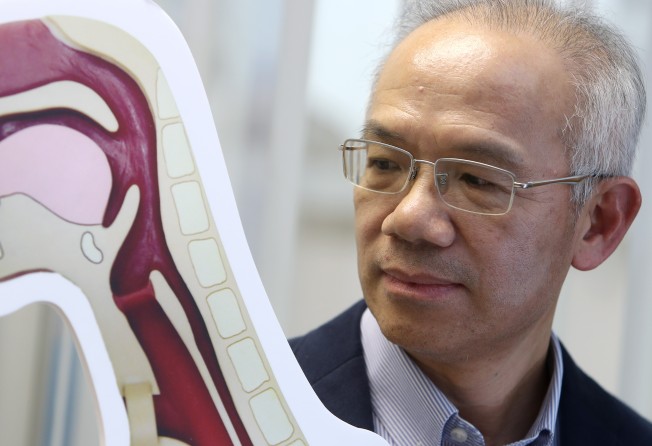Why we should pay more attention to a lesser-known swallowing disorder affecting the elderly
Study shows 30 per cent of Hong Kong’s population are unaware of dysphagia, a condition which affects 600,000 people

It takes the human body six nerves and 26 muscles to complete the process of swallowing, and while most people take this reflex for granted, it can be a Herculean task for some of the elderly inflicted with dysphagia, a lesser-known medical condition.
Such patients have an inability to swallow, resulting in choking. The disorder affects older people because of age-related changes in the body, according to speech therapist Joshua Mak, who assesses and treats dysphagia patients.
“The problem is mostly seen in the older age group due to the typical health conditions that develop,” Mak says. “[The act of swallowing] involves the epiglottis covering the trachea, so food goes into the oesophagus,” he adds, referring to parts in the throat.
“As people age, problems with this reflex may appear which cause the tragedy.”
According to a recent survey conducted by the Mighty Oaks Foundation, an NGO that promotes a healthy and safe living environment for the city’s elderly, 30 per cent of the population are unaware of the seriousness of the condition while about 600,000 Hongkongers have the disorder.
“When people of old age choke, others always regard it as they are eating too fast, causing the food to go down the wrong airway. But this is wrong.
“Most of the time, it’s actually because part of their eating muscles have deteriorated and they’re unable to chew and swallow the food the way they used to,” Mak says.
The misconception is so prevalent that people are overlooking the problem, he warns.
Foundation director Tan Poh Lee says: “When caring for the elderly, family members and carers generally focus on whether they can walk, or if they are prone to falling, or whether they’re sleeping well at night.
These conditions are mainly what we focus on while neglecting other signs that are indicative of problems associated with swallowing or eating.”
Dr Leung King-shing, who also took part in the research, says there are ways to look for clues.
“If they are coughing all the time, it would be wrong to assume that it’s a chronic cough or respiratory issue because there’s a chance they are unable to swallow saliva properly.
“Another obvious sign is when they refuse food. They know what causes the discomfort so if they are steering clear from any food or drink, that is a significant sign,” Leung says.
The Census and Statistics Department estimates that the number of Hongkongers aged 65 or above will double to 2.37 million in the next two decades. With this in mind, the foundation has joined hands with the Hong Kong Association of Speech Therapists to shed light on the disorder and raise awareness on how to manage dysphagia.
“Our overarching principle is the belief that everyone deserves to eat well and such problems, be they swallowing or choking, or even refusal of food, should be tackled properly,” Tan says.
Cecilia Yuen, a carer for her sister who has dysphagia, says patience is the key when it comes to looking after recovering patients. “With every spoonful of food I gave her, I would make sure she swallowed it properly.”
People diagnosed with the disorder will undergo assessments and oral exercises. With the right kind of diet, which includes appropriate food selections for texture and consistency, their motor skills may be gradually restored.
“While the condition cannot be completely cured, with the right treatment I have seen patients going from shredded food to soft food and eventually back to eating regular food,” Mak says.